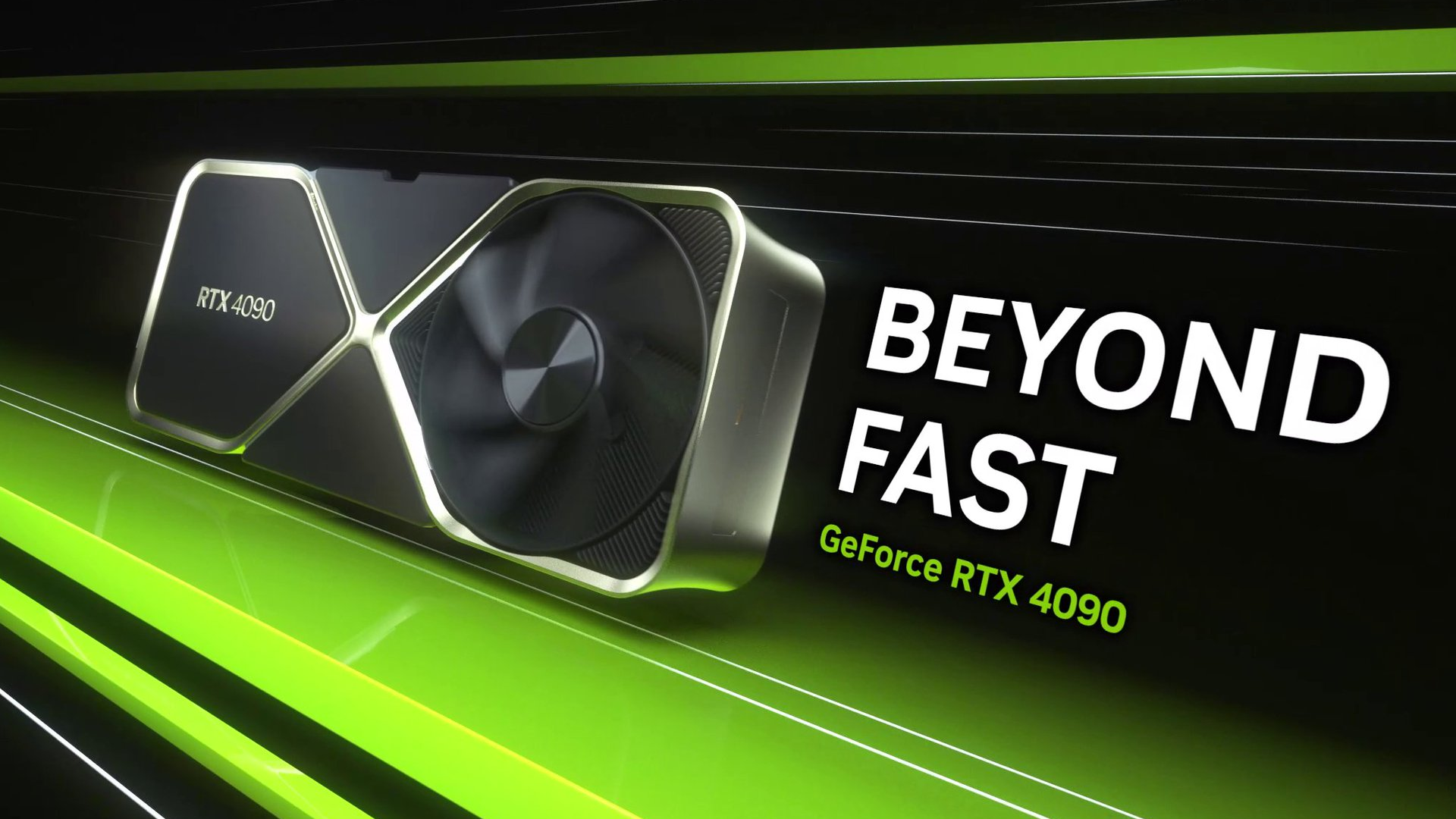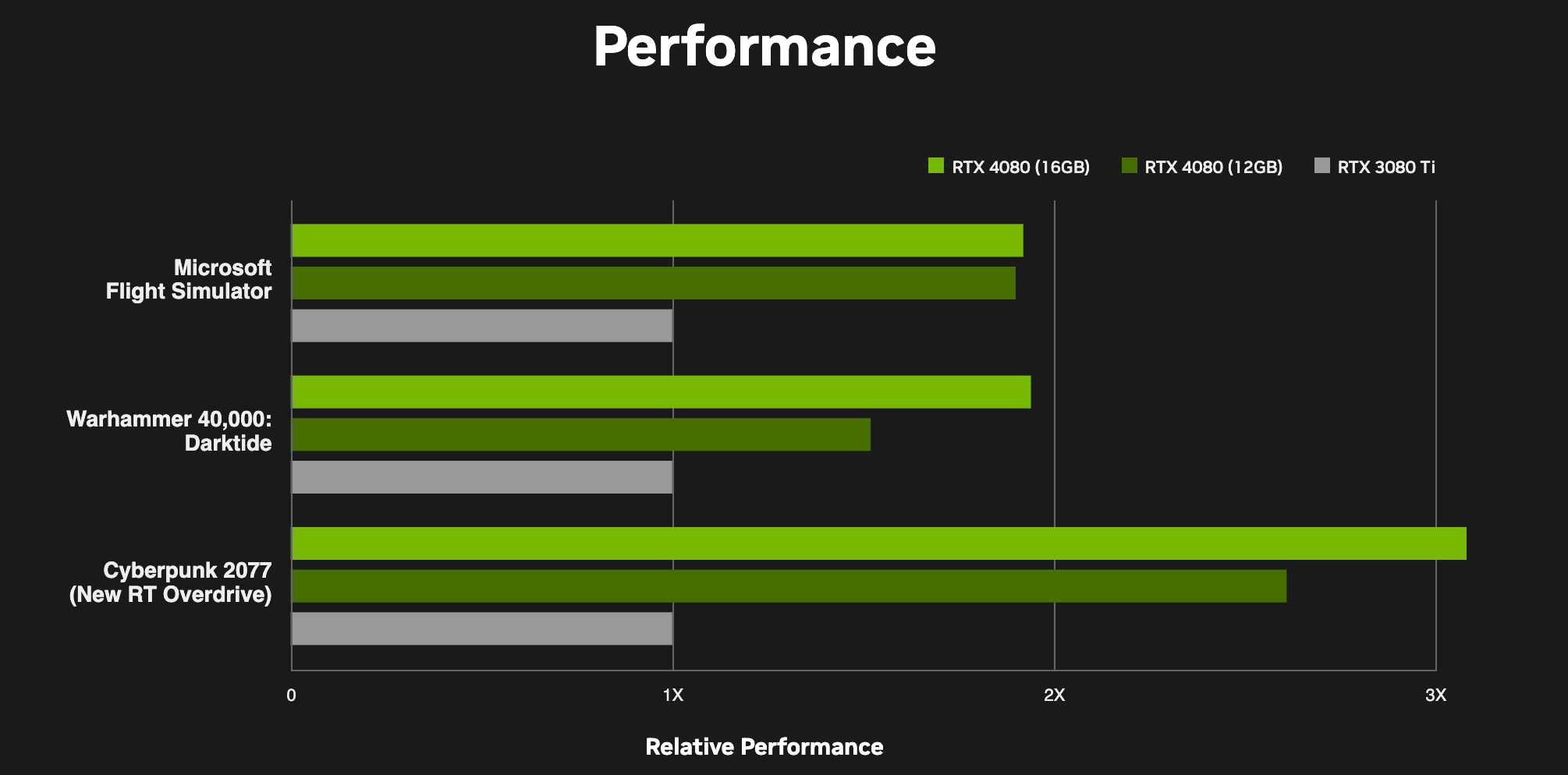RTX 4080 vs RTX 3080: Is it worth the upgrade?
If you're pondering whether or not to upgrade to an RTX 4080, take a look at our comparison against the 30 series cards

The Nvidia GeForce RTX 4080 GPU launched in late 2022, along with the flagship RTX 4090. The latest generation of GPUs from Nvidia offers quite the substantial leap up in terms of performance and efficiency, and this is thanks, in part, to the new Ada Lovelace architecture.
With each new card that's releasing, we're noticing the substantial benefits this new generation is bringing in terms of pure gaming performance, and for those considering an investment in a higher end card, it's good to know exactly what differences there are between the new generation, and the potentially more affordable 30 series.
So how do these new graphics cards actually stack up against the best graphics cards people have been clambering over one another to try and get their hands on for the past few years? For starters, the higher-end Nvidia RTX 4090 comes in at $1,599 / £1,679, and the Nvidia RTX 4080, with two dedicated memory options, comes in at $899 / £949 (12GB) or $1269 / £1269 (16GB). Since these prices are above the previous generation boards, it's easy to write things off then and there. However, value for money is a big deal when you're looking at this type of hardware, and that's where the new-gen cards get seriously interesting.
We've summarised the specs of the new RTX 4080 below to see how it compares with the RTX 3080. This allows you to be sure that investing in this new card is the right thing for you before making a massive monetary commitment.
RTX 3080 vs RTX 4080: Specs
| Header Cell - Column 0 | Nvidia GeForce RTX 4080 (16GB) | Nvidia GeForce RTX 3080 (12GB) |
|---|---|---|
| NVIDIA CUDA Cores | 9728 | 8960 |
| Boost Clock | 2.51 GHz | 1.71 GHz |
| Memory Size | 16 GB | 12 GB |
| Memory Type | GDDR6X | GDDR6X |
| Ray Tracing Cores | 3rd Gen | 2nd Gen |
| MRSP / RRP | $1269 / £1269 | $699 / £649 |

RTX 3080 vs RTX 4080: Performance
Nvidia has claimed that the RTX 4080 will boast over three times relative performance when compared to the RTX 3080 Ti, meaning it's even stronger when compared to the standard RTX 3080 card.
Both cards feature Nvidia DLSS, which is AI-enhanced video performance. This allows for your machine to provide you with higher frame rates as AI fills in the gaps. However, DLSS 3.0 that's found in the 4080 is vastly superior, since it's able to generate entire frames, not just pixels. For the growing number of games that support DLSS 3.0, this is a massive pro for the 4080. Nvidia claims it can take frames from 22 up to 85 in Cyberpunk, for example. This is down to the Fourth-Gen Tensor Cores which you can find in the 40 series cards, whereas the 30 series cards only feature first gen ones.
The new card also has New Streaming Multiprocessors which Nvidia states will lead to up to two times more performance and power efficiency when gaming or streaming. The new generation has much more efficient power usage, as well as Ada Lovelace architecture, which allows for massive leaps in power without making too much difference to form factor and power usage. In addition, Nvidia is also using a new Ada RT Core in the new higher-end cards for more efficient ray tracing, as well as a method of reordering shader execution.
Weekly digests, tales from the communities you love, and more
You can see information from Nvidia about the relative performance of the RTX 4080 compared to the RTX 3080 Ti below.

RTX 3080 vs RTX 4080: Value for money
Value for money is fairly subjective, and dependent on your situation, your needs, and your coffers. You'll find that the 4080 comes in at almost double the price of the 3080, meaning you've got to consider whether or not the new card is going to be worth it. The cost of the new cards rings in at about the same cost of an entire prebuilt machine featuring a 3080, which is something worth noting.
If you need the absolute best of the best, then a newer 4080 card will probably be the one for you. As you can see from the features and performance Nvidia has managed to find in this new generation of GPUs, it's hardly an incremental step up for the sake of it. For many people, that's value for money on its own.
If you're a gamer who sticks to the classics and you don't really stream, its likely you wont see much change in your performance compared to a 30 series graphics card, as they are already able to pump out excellent performance on less intensive games. On the other hand, if you have the money, DLSS 3.0 will absolutely be the futureproofed option to spend a bit more money on. Looking ahead, a 4080 will likely last you a lot longer than a 3080 - especially the way gaming PCs are heading in 2023. If you stream, or create a lot of content, especially from one PC, then a higher end card will definitely be more reliable.
Whether or not this card is considered good value for money is down to how far you intend to push its limit. If you know you can still get optimum performance from the 3080, then that is a great option for less money.
Overall - should you upgrade?
If you're considering upgrading a new RTX 4080 GPU, then you need to think about what you'll need it for. If you have the money to spend, the leap in performance will absolutely be worth it. If you want a high-end GPU but aren't that worried about futureproofing and getting the absolute best of the best performance out of your gaming PC, then a 3080 is still an exception card. With the new generation's release, it's easy to forget that not too long ago, the 3080 was one of the most coveted components in recent memory.
Overall, it's up to you, your needs, and your allowance. For the majority of folks, the RTX 4080 is not an upgrade you need, especially if you already have a 3080 or similar. If you're trying to decide on either a 3080 or a 4080, either will give you some incredible performance in the latest games. The 4080 is a substantial leap up in terms of features and performance, but don't just buy it because you feel you need to keep up.
If you don't want to wait for a new GPU then you can check out our best graphics cards or best gaming PCs. If you're after something more portable then you can also check out our best gaming laptops.
One of my earliest memories is playing SuperMario64 and wondering why the controller I held had three grips, but I only had two hands. Ever since I've been in love with video games and their technology. After graduating from Edinburgh Napier University with a degree in Journalism, I contributed to the Scottish Games Network and completed an Editorial Internship at Expert Reviews. Over the last decade, I’ve been managing my own YouTube channel about my love of games too. These days, I'm one of the resident hardware nerds at GamesRadar+, and I take the lead on our coverage of gaming PCs, VR, controllers, gaming chairs, and content creation gear. Now, I better stop myself here before I get talking about my favourite games like HUNT: Showdown, Dishonored, and Towerfall Ascension.
- Jasmine MannanHardware Editor


